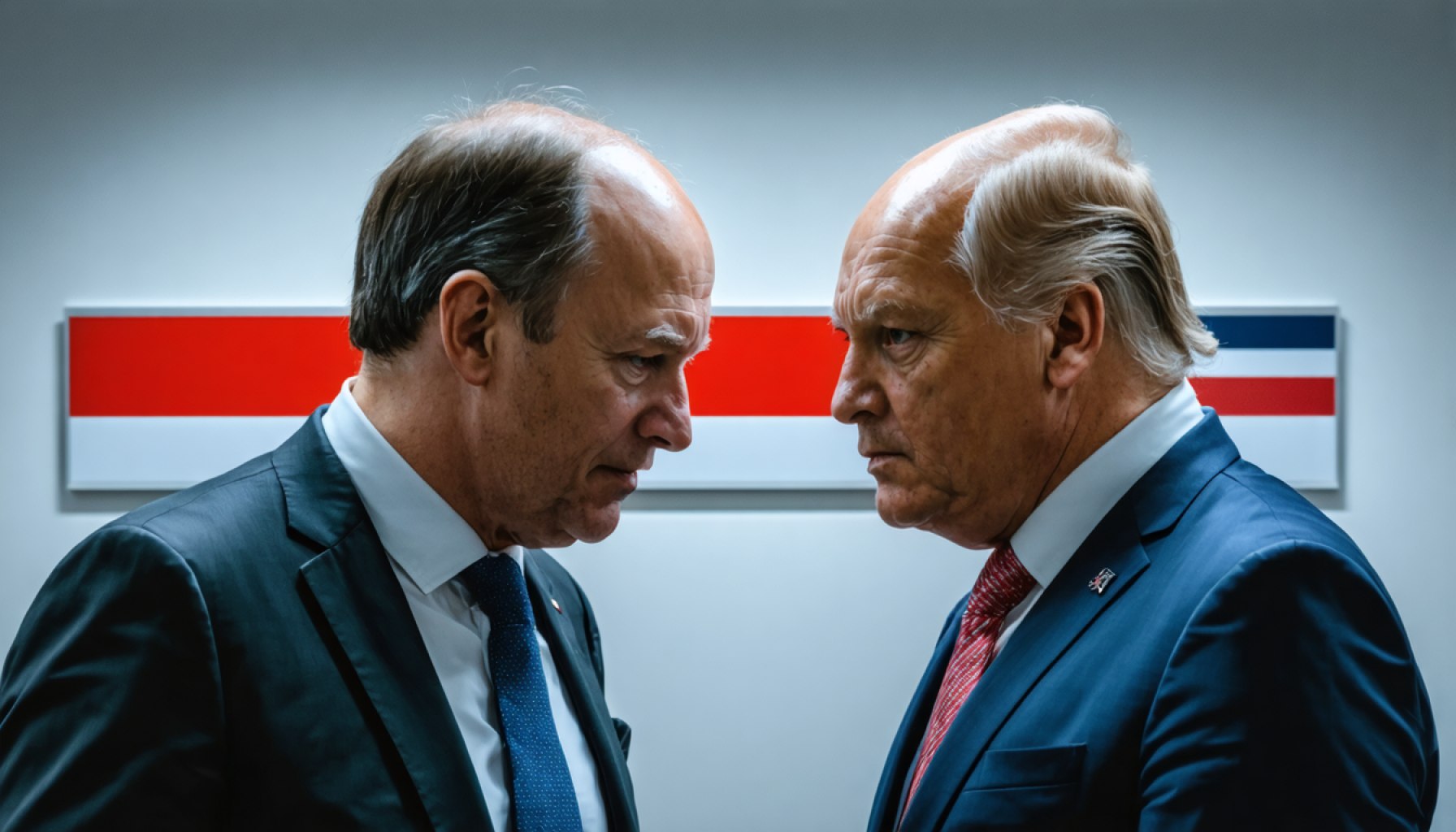- Friedrich Merz and Olaf Scholz represent contrasting leadership styles in Germany’s political landscape.
- The documentary “Kanzler und Herausforderer” highlights their transformations and evolving political personas.
- Scholz’s extensive government experience contrasts with Merz’s time spent in the corporate world.
- The tension between Merz’s determination and Scholz’s resilience unfolds amidst a nation questioning its identity.
- Merz aims to lead the Union despite potential internal discord, whereas Scholz, deemed unpopular, relies on unexpected confidence.
- Their struggle is a microcosm of leadership challenges and change in modern Germany.
In the bustling heart of Germany’s political theater, two men stand at the eye of a storm, embodying contrasts so stark, they captivate a continent. Friedrich Merz, the seasoned politician with a flair for the dramatic, finds himself in a candid face-off against the pragmatic Olaf Scholz. Both are vying not just for the chancellorship, but for the very soul of a nation at a crossroads.
As cameras roll for the documentary “Kanzler und Herausforderer,” filmmakers Mathis Feldhoff and Andreas Huppert unearth a transformation in their subjects. Merz, often seen as impulsive, attempts to don a cloak of statesmanship, while Scholz, typically measured, surprises with bold discourse and a newfound assertiveness. Their political journeys diverge remarkably: Scholz, with his extensive record in various governments, and Merz, whose brief foray in politics was punctuated by a significant hiatus in the corporate world.
Their story unfolds against the backdrop of a nation questioning its identity. Merz seeks redemption, steering the Union with unyielding determination to the top. In contrast, Scholz contends with the aftermath of leading Germany’s first traffic-light coalition, where victories were often overshadowed by setbacks.
The narrative intensifies as election day looms. Can Merz maintain his poll advantage, or will discord within his ranks unravel his ambitions as it did six years prior? Meanwhile, Scholz, labeled the most unpopular chancellor in recent history, clings to a confidence few understand.
As voting day approaches, these opponents embody the hopes and fears of a nation on edge. The tale of Merz and Scholz is not just political drama; it is a dynamic exploration of leadership, change, and the relentless pursuit of power in modern Germany.
Inside Germany’s Political Showdown: What You Need to Know
How-To Steps & Life Hacks
Engaging with Political Content:
1. Stay Informed: Follow reliable news sources like Deutsche Welle or Der Spiegel for unbiased coverage of the political landscape.
2. Join Discussions: Participate in forums or local community events to gain diverse perspectives.
3. Fact-Check Statements: Use platforms like FactCheck.org to verify public statements made by politicians.
4. Engage with Documentaries: Watch “Kanzler und Herausforderer” for an in-depth perspective on Merkel and Scholz.
Real-World Use Cases
Impact on Economy and Policies:
– Economic Strategies: Scholz’s policies could continue focusing on social welfare and climate initiatives, potentially affecting Germany’s economy and EU relations.
– Corporate Influence: Merz, with his corporate background, might focus on encouraging business growth and deregulation.
Market Forecasts & Industry Trends
The German political scene will likely influence the EU’s economic strategies, especially post-Brexit. Expect significant trends in energy transition strategies and digital innovation.
Reviews & Comparisons
– Merz vs. Scholz as Leader: Scholz is lauded for experience and steady governance; Merz is seen as dynamic and potentially disruptive with his business acumen.
– Popularity and Public Perception: Scholz, despite low popularity as chancellor, retains a reputation for reliability. In contrast, Merz is appreciated for his fresh insights but criticized for his political hiatus.
Controversies & Limitations
– Merz’s Corporate Ties: Critics worry about potential conflicts of interest from his past corporate roles.
– Scholz’s Coalition Struggles: The traffic-light coalition has faced criticism for its internal discord and policy setbacks.
Features, Specs & Pricing
In terms of political platforms:
– Scholz: Advocates for social policies, climate action, and EU integration.
– Merz: Focuses on economic reform and strengthening Germany’s global economic position.
Security & Sustainability
– Security: Both leaders address cybersecurity as an increasing concern, with potential investments in infrastructure.
– Sustainability: Scholz and Merz differ on how to reach climate goals, reflecting Germany’s pivotal role in the global green transition.
Insights & Predictions
– Scholz’s Approach: Likely to continue a moderate leftward policy focus.
– Merz’s Agenda: Could bring economic liberalism and stronger ties with business sectors, altering the current economic trajectory.
Tutorials & Compatibility
– Political Engagement Tools: Use digital platforms for political engagement or voting reminders. Consider apps like WahlSwiper to match your views with political candidates.
Pros & Cons Overview
Scholz:
– Pros: Experienced, stable leadership.
– Cons: Low popularity and coalition challenges.
Merz:
– Pros: Fresh perspective, business savvy.
– Cons: Lack of recent political experience and potential for internal discord.
Actionable Recommendations
– Stay Engaged: Regularly update your knowledge on German politics to influence elections and policies.
– Watch “Kanzler und Herausforderer”: Gain unique insights into potential leadership impacts.
– Participate in Surveys: Engage with platforms like YouGov for public opinion polling.
Conclusion: As Germany stands at a political crossroads, understanding the realities and implications of leadership choices can better inform voting decisions and civic engagement. Stay informed, critically engaged, and ready to adapt as new political dynamics unfold.
